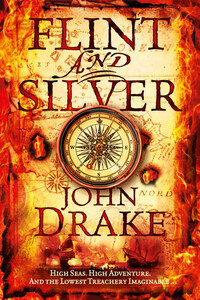15th March 1745 Off Madagascar
Ria de Ponteverde carried guns; most merchantmen did: carriage guns, with powder and shot, rammers and sponges, trucks and tackles. They differed from ships of the various royal navies only in the relatively small degree of their armament, as compared with the exclusive concentration upon artillery that marked out the man-o’-war.
And it wasn’t just a broadside battery on the main deck. It was swivels on the gunwale, and small arms in the lockers down below: muskets and pistols, pikes and cutlasses, and all the gear that went with them – cartridges, flints, powder horns and small-grained pistol powder. All this was a fearful expense and a burden upon trade, for there was not one farthing’s profit to be made by honest seamen in hauling defensive arms and ammunition across the seven seas.
Unfortunately there were others on the seas who were not honest seamen, and whose business it was to become very rich, very quickly by selling cargoes without the bother of paying for them. Hence the need for guns, because sometimes –indeed often – these gentlemen could be seen off by force. Sometimes, but not always. And now, six miles off the Bahia de Bombetoka, a general slaughter was about to begin.
The Portuguese brig Ria de Ponteverde and the buccaneer Victory were locked yardarm to yardarm in a stinking cloud of powder smoke that barely shifted in the hot, tropical air. The brig was beaten. She was broken, bloodied, smashed and splintered; her helm was shot away, her sails in shreds and Victory’s boarders were pouring over her sides.
A tall yellow-haired Englishman stood with his Portuguese mates by Ria de Ponteverde’s mainmast among the shattered spars and dismounted guns, the silent dead and the howling wounded, as the boarders came through the smoke cheering and hacking and killing. Firearms boomed and jumped on either side. Right next to the Englishman, his captain, José Carmo Costa, took the flash and thunder of a blunderbuss at close range, blowing large parts of his heart, lungs and breastbone clear out through the back of his shirt.
Then it was cold steel, hand to hand, and no quarter asked or given.
The Englishman swung a cutlass with all his might. He was a big man: muscular, quick and agile with long limbs and not a scrap of fat on his body. The blow came down like the wrath of God and caught his first man – fair, square and smack – on top of the head.
The heavy blade clove to the teeth, slicing bone, brains, meat and gristle. Number one dropped twitching and shivering, and the blade jerked free with a disgusting schlik. Then a dozen men, jammed in ferocious fight, rolled into the Englishman and a bedlam of noise beat at his ears. Arms, blades and bludgeons worked busily all around and instinctively he kicked and elbowed with enormous strength, clearing a fighting space around him, and – seizing the instant chance – ran the point of his weapon into the middle of his second man, who yelped and twisted and tried to pull free. But the pirate stumbled and went over face down, and the Englishman stamped a heel snapping and crunching into the base of his victim’s spine while he leaned mightily on his sword arm, driving the blade through the wriggling body and into the planks of the deck, even as the dense press of combat knocked him clear, still gripping the slimy hilt.
He cut down number three with two strokes: the first shearing fingers, the second splitting a face. Four and five took just a single cut each, one to left and one to right; a tall black with rings in his ears, and a squint-eyed barrel-chested fellow armed with a boarding pike.
Six was the hardest. He was a small man with a straw hat, striped breeches, quick feet and a straight-bladed sword honed to a wicked point, which he used to the exclusion of the edge. This man was a swordsman, which the Englishman was not – he had now to learn or to die.
Sweat flew as he wrenched his cutlass to and fro, trying with sheer speed and force to overcome skill. Ssssk! The cutlass blade sliced a larynx without killing. Jab! Jab! Jab! The rapier missed twice then sank an inch into the Englishman’s side, before he beat it clear with a clash and a scrape of steel. Jab! Into his hip. Chunk! And the tip of the swordsman’s elbow was off like the top of a breakfast egg. Jab! Into the Englishman’s cheek. Swish! Through the straw hat, slicing away hair and a patch of scalp. Then a blur of light and the Englishman cut hard into the right side of the other’s neck, sinking the blade through flesh, fat and marrow to within an inch of the left-hand side, almost but not quite taking the head clean off.








